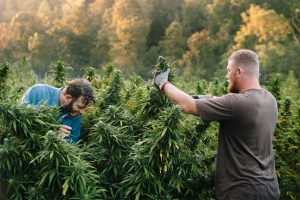Industrial Hemp: A Versatile and Sustainable Crop with Countless Applications
Industrial hemp, scientifically known as Cannabis sativa L., is a versatile and sustainable crop with a long history of use dating back thousands of years. Unlike its cousin marijuana, industrial hemp contains minimal levels of psychoactive compounds such as THC, making it an ideal candidate for a wide range of industrial and commercial applications. From textiles and building materials to food and biofuel, industrial hemp offers a plethora of benefits and opportunities for farmers, businesses, and consumers alike.
Historical Significance:
The cultivation of hemp can be traced back to ancient civilizations such as China, where it was used to make textiles, paper, and rope. In Europe, hemp was a staple crop during the Middle Ages and was widely cultivated for its fiber and seed. Early American colonists also relied on hemp for a variety of purposes, including textiles, sails, and even paper.
Industrial Uses:
One of the most notable features of industrial hemp is its versatility. Virtually every part of the plant can be utilized for various industrial applications:
1. Fiber: Hemp fiber is renowned for its strength, durability, and breathability, making it an ideal material for textiles, rope, canvas, and paper. Hemp fibers are also eco-friendly and biodegradable, making them a sustainable alternative to synthetic materials.
2. Seeds: Hemp seeds are rich in protein, healthy fats, vitamins, and minerals, making them a valuable nutritional resource. Hemp seed oil is also used in a variety of food products, cosmetics, and skincare products due to its moisturizing and nourishing properties.
3. Oil: Hemp oil extracted from the seeds is commonly used in cooking, as a nutritional supplement, and in the production of biodiesel. Hemp oil is rich in omega-3 and omega-6 fatty acids, which are essential for human health.
4. Building Materials: Hempcrete, a mixture of hemp fibers, lime, and water, is gaining popularity as a sustainable alternative to traditional building materials such as concrete. Hempcrete is lightweight, breathable, and has excellent insulation properties, making it ideal for eco-friendly construction projects.
5. Biofuel: Hemp biomass can be converted into biofuels such as ethanol and biodiesel, providing a renewable and environmentally friendly alternative to fossil fuels. Hemp biofuels produce fewer greenhouse gas emissions and can help reduce dependence on non-renewable energy sources.

Stiiizy
Regulatory Landscape: Industrial Hemp
Despite its numerous benefits and applications, industrial hemp has faced regulatory challenges in many parts of the world, particularly in the United States. For decades, hemp was classified as a Schedule I controlled substance under federal law, alongside marijuana, making it illegal to cultivate and harvest hemp without a special permit.
However, in recent years, there has been a growing movement to legalize and regulate the cultivation of industrial hemp. The passage of the 2018 Farm Bill in the United States removed hemp from the list of controlled substances and classified it as an agricultural commodity, paving the way for the widespread cultivation of hemp for industrial purposes.
Environmental Benefits:
In addition to its economic and industrial potential, industrial hemp offers significant environmental benefits. Hemp requires minimal water, pesticides, and fertilizers to grow, making it a highly sustainable crop compared to conventional agricultural crops such as cotton or soybeans. Furthermore, hemp plants absorb carbon dioxide from the atmosphere during photosynthesis, helping to mitigate climate change and reduce greenhouse gas emissions.
Conclusion:
Industrial hemp is a versatile, sustainable, and environmentally friendly crop with countless applications and benefits. From textiles and building materials to food and biofuel, hemp has the potential to revolutionize numerous industries and promote a more sustainable future. As regulatory barriers continue to fall and awareness of hemp’s potential grows, industrial hemp is poised to become a cornerstone of the green economy and a key player in the fight against climate change.

Stiiizy

